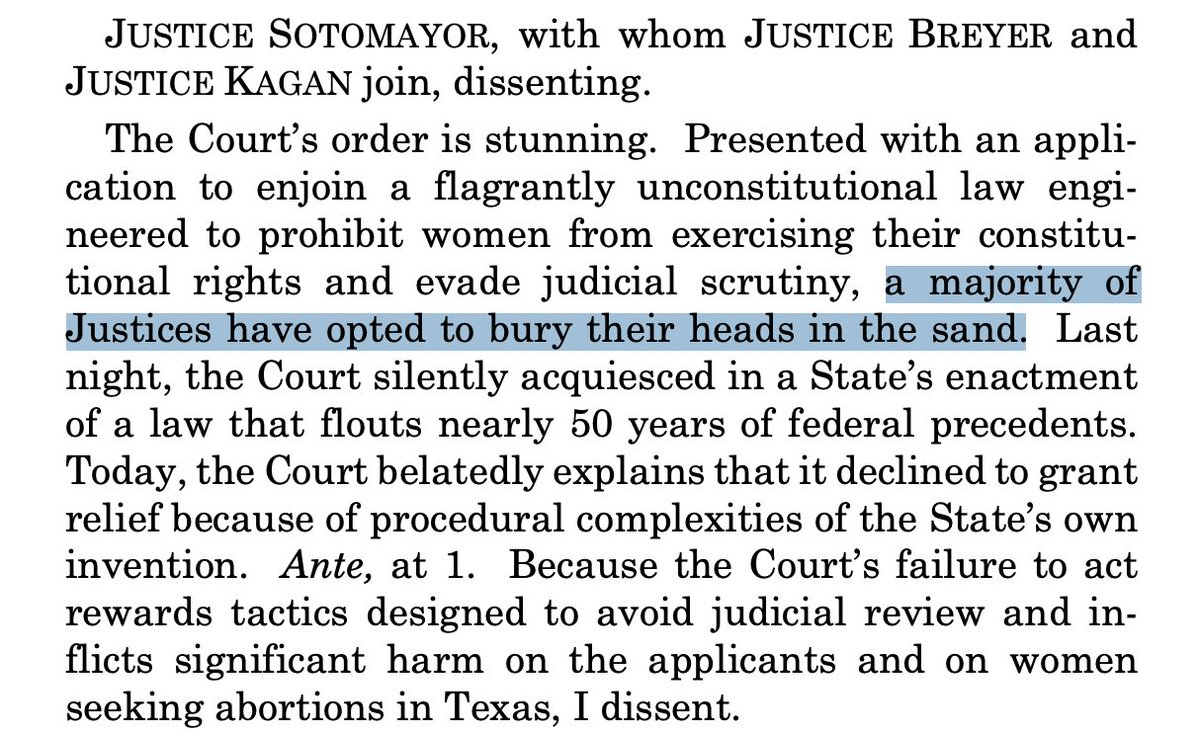General Discussion
Related: Editorials & Other Articles, Issue Forums, Alliance Forums, Region ForumsSupreme Court, Breaking Silence, Won't Block Texas Abortion Law.
*Too significant to comply with 'copyright' restrictions.*
The law, which prohibits abortions after six weeks and went into effect on Wednesday, was drafted by Texas lawmakers with the goal of frustrating efforts to challenge it in federal court.
Published Sept. 1, 2021
Updated Sept. 2, 2021, 12:16 a.m. ET
The Supreme Court on Wednesday refused to block a Texas law prohibiting most abortions after about six weeks of pregnancy. The move, a response to an emergency application from abortion providers in the state, came less than a day after the law became effective, severely restricting access to the procedure.
The vote was 5 to 4, with Chief Justice John G. Roberts Jr. joining the court’s three liberal members in dissent.
The majority opinion was brief and unsigned, and it said the providers had not made out their case in the face of “complex and novel” procedural questions.
“In reaching this conclusion,” the opinion said, “we stress that we do not purport to resolve definitively any jurisdictional or substantive claim in the applicants’ lawsuit. In particular, this order is not based on any conclusion about the constitutionality of Texas’ law, and in no way limits other procedurally proper challenges to the Texas law, including in Texas state courts.”
In dissent, Chief Justice Roberts wrote that he would have blocked the law while appeals moved forward.
“The statutory scheme before the court is not only unusual, but unprecedented,” the chief justice wrote. “The legislature has imposed a prohibition on abortions after roughly six weeks, and then essentially delegated enforcement of that prohibition to the populace at large. The desired consequence appears to be to insulate the state from responsibility for implementing and enforcing the regulatory regime.”
In a separate dissent, Justice Sonia Sotomayor, joined by Justices Stephen G. Breyer and Elena Kagan, was more direct.
“The court’s order is stunning,” she wrote. “Presented with an application to enjoin a flagrantly unconstitutional law engineered to prohibit women from exercising their constitutional rights and evade judicial scrutiny, a majority of justices have opted to bury their heads in the sand.”
“The court has rewarded the state’s effort to delay federal review of a plainly unconstitutional statute, enacted in disregard of the court’s precedents, through procedural entanglements of the state’s own creation,” Justice Sotomayor wrote. “The court should not be so content to ignore its constitutional obligations to protect not only the rights of women, but also the sanctity of its precedents and of the rule of law.”
The Texas law, known as Senate Bill 8, amounts to a nearly complete ban on abortion in Texas because 85 to 90 percent of procedures in the state happen after the sixth week of pregnancy, according to lawyers for several clinics. On Tuesday night, clinics were scrambling to see patients until the minute the law went into effect, with six-hour waits for procedures in some places. By Wednesday, the patient lists had shrunk, clinic workers said in interviews.
The Texas law is the latest battle over abortion rights in the United States, a legal fight that began in 1973, with the Roe v. Wade Supreme Court decision that established a constitutional right to the procedure. But in recent years, anti-abortion campaigners have found success through laws in state legislatures, and a broad swath of the South and the Midwest now has limited access to abortions.
Texas has about 24 abortion clinics, down from roughly 40 before 2013, when the State Legislature imposed a previous round of restrictions. It was not immediately clear on Wednesday if every one of them was complying with the law, which the Republican governor signed in May, but many, in interviews, said they were.'>>>
https://www.nytimes.com/2021/09/01/us/supreme-court-texas-abortion.html
NOTE:
'The majority opinion was brief and unsigned, and it said the providers had not made out their case in the face of “complex and novel” procedural questions.
“In reaching this conclusion,” the opinion said, “we stress that we do not purport to resolve definitively any jurisdictional or substantive claim in the applicants’ lawsuit. In particular, this order is not based on any conclusion about the constitutionality of Texas’ law, and in no way limits other procedurally proper challenges to the Texas law, including in Texas state courts.”
In dissent, Chief Justice Roberts wrote that he would have blocked the law while appeals moved forward.'

Mr.Bill
(24,281 posts)and the Supreme Court are working the graveyard shift. How appropriate.
LeftInTX
(25,254 posts)I can't believe they did this.....
Really??? TBH, I would feel better if they went along with just a plain old ban, but this viglante stuff is messed up sheat...
How can this even be constitutional????
elleng
(130,865 posts)“we stress that we do not purport to resolve definitively any jurisdictional or substantive claim in the applicants’ lawsuit. In particular, this order is not based on any conclusion about the constitutionality of Texas’ law, and in no way limits other procedurally proper challenges to the Texas law, including in Texas state courts.”